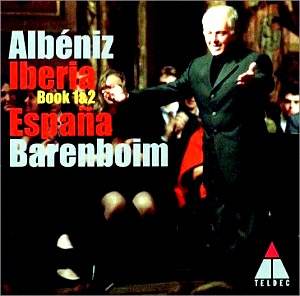Isaac ALBÉNIZ (1860-1909)
Iberia (Books One and Two)
España
Daniel Barenboim (piano)
Teldec Studio Berlin December 1999/February 2000
TELDEC 8573-81703-2 [62:25]
Crotchet AmazonUK AmazonUS Amazon recommendations
How refreshing to hear such delightful Spanish music played so sensitively and with such style.
Iberia 1st book
The opening passages of 'Evocation' are played with subtle technique, passion and colour; the gentle rhythms sympathetically drawn - dreamy and evocative with exquisite pianissimo passages. 'El Puerto' is throbbing and exciting with very lovely phrasing and colour. The syncopated passages are a delight to hear. 'Fête-Dieu à Séville' is a celebration in Spanish style, it's a colourful musical portrait; all life processes there - timpani rolls, bells tolling and strutting Spaniards. Suddenly, the excitement gives way to tranquil pianissimo.
Iberia Book 2
The 'Rondeña' takes its name from the small town of Ronda. Its fandango dance rhythm conjures up a scene of heat, siesta and gentle living, the time signature constantly changing. 'Almeria' is another colourful portrait of a Mediterranean port scene. Frequently changing rhythms are followed by a beautiful expressive melody which catches the listener unexpectedly. Barenboim's technique cleverly portrays the scene with delicate tints and dynamics, a most delightful track. The final piece in Book 2, 'Triana', so named after a part of Seville has graceful 'Pasa Doble' dance rhythms gradually building up to a feisty forte finale.
España. The six pieces that form the suite España, written in London in 1890, are simple in structure but nonetheless melodic and begin with a short prelude. 'Tango', the best known perhaps, has a dreamy quality despite its exotic rhythm. 'Malaguena' takes its name from the city of Malaga and its rhythm from the Fandango. Beneath an ostinato figure in the right hand, an obvious Spanish melody can be heard in the left hand, with arpeggiated chords. 'Serenata' is somewhat less Spanish in style and sound but is very sensitively played. 'Caprichio Catalan' - in this evocative piece, Albeniz is remembering his homeland, its simple melody is pleasing and memorable. Finally, 'Zortico', a Basque dance rhythm in 5/8 time, is both colourful and passionate in its tenderness.
Daniel Barenboim seems to have a particular affinity for Spanish music. His empathy with the musical soul of Albeniz, and what he was trying to say, make this recording an exciting and most enjoyable experience.
Grace Barber
